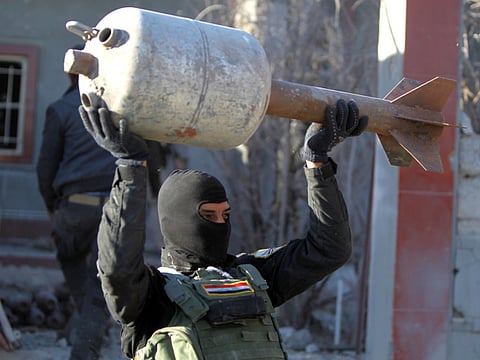Only 300 Daesh terrorists left in Iraq’s Ramadi
Civilians, raising white flags to approaching soldiers, have raced to safety under a hail of gunfire

Baghdad: More than six months after falling to Daesh, the city center of Ramadi is under siege by Iraqi security forces and tribal fighters backed by US airpower. Commanders say that as few as 300 terrorists remain holed up inside, behind a defense of elaborate tunnels, booby-trapped buildings and roads laced with hidden bombs.
As Iraqi soldiers and tribal fighters have advanced on the city, clearing the outlying neighborhoods in preparation for what is expected to be a grueling and bloody fight for the center, they have discovered the things left behind by Daesh: lists of former government workers who repented to save their lives, and lists of others believed to have been executed; marriage certificates stamped by a Daesh court; the bodies of militants.
Civilians, raising white flags to approaching soldiers, have raced to safety under a hail of gunfire by Daesh fighters who sought to use them as human shields. Others have had to pay hefty bribes to fighters to be allowed to leave.
“The condition of families under the control of Daesh is tragic,” Abu Hussain, who escaped recently, said.
“They do not let people out, and food and medication is running low because of the siege on all exits of the city.”
After months of false starts and unfulfilled promises of quick gains by Iraqi and US leaders, the campaign for Ramadi - the capital of Anbar, a vast Sunni-dominated region in western Iraq - has finally yielded some success. Iraqi security forces and Sunni tribal fighters trained and equipped by the United States have in recent days taken Ramadi’s largest neighborhood and captured the building that was the headquarters of the Anbar Operations Command, and they are bearing down on the city’s centre.
“A number of areas have been liberated, and we are seeing great victories on the ground, and the security forces have fully surrounded the city,” said Shaikh Sufyan Al Ethawi, a tribal leader in Anbar.
What remains is a tough, urban battle for Ramadi, which fell to Daesh in May, and some officials say it could be weeks before the city is finally liberated from Daesh.
A victory there, by no means assured, would be the most significant gain yet by the US-led coalition fighting Daesh, given that Anbar is seen as an area where the group is deeply entrenched and has enjoyed a measure of local support. Other victories have come in Sinjar, in the north, where Kurdish fighters backed by US air strikes recently pushed out Daesh, and in Tikrit earlier this year.
Yet even if Ramadi is liberated, Daesh would still control a vast territory that straddles the border between Iraq and Syria, including the group’s de facto capital - Raqqa, Syria - and Mosul, Iraq’s second largest city.
Col. Steven H. Warren, a US military spokesman in Baghdad, told reporters on Thursday of the Ramadi battle: “It’s a slow process; it’s a deliberate process. And urban fighting is tough. It’s hot, it’s scary and it can be deadly.”
Warren said that US officials, before the offensive, estimated that there were 600 to 1,000 Daesh fighters in Ramadi, and that US air strikes over the last week had killed 350 of them. It was unclear whether the heavy barrages around populated areas had also caused civilian casualties.
As the fight unfolds for Anbar, an expansive desert region where close to 1,300 American soldiers and Marines died in the years after the US invasion, the United States is weighing a greater role. That reflects not only the strategic importance of Ramadi as a capital of Sunni Iraq, but also a political imperative, as Iran’s and Russia’s influence in Iraq has grown in recent months.
Defense Secretary Ash Carter said recently that the United States was willing to deploy attack helicopters and advisers to help Iraqi forces “finish the job” of retaking Ramadi, provided the Iraqi government requested them.
That request has not yet been made, but one senior Iraqi official, who spoke on the condition of anonymity because of the continuing deliberations, said the government was likely to ask.
Yet a greater, more overt US role in the fight could come with negative political consequences for the US-backed prime minister, Haider Al Abadi, a Shiite, who is locked in a power struggle with rivals from his own party and Shiite militia leaders backed by Iran.
Those rivals have denounced a greater military role for the United States, and in some cases have vowed to fight the Americans. This raises the possibility that United States forces, if their numbers grow substantially in Iraq, could find themselves fighting Iran’s proxies, as they did during the long US occupation after the invasion of 2003.
Al Abadi - in a delicate position as he tries to balance his relations with the United States and Iran, which controls militias whose leaders are popular among the Shiite public - has issued statements recently promoting Iraqi sovereignty and saying that foreign military forces are not needed in Iraq.



